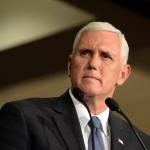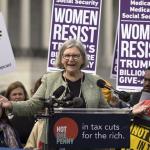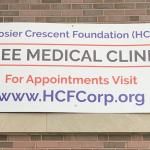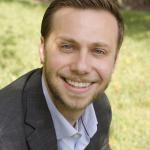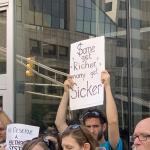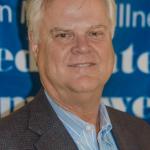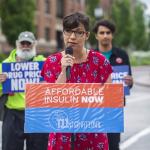This article by our editor, co-published in the Health and Human Rights Journal, tells the story of two ambitious politicians who set out a few years ago to undercut Medicaid in their state. Then-Governor of Indiana Mike Pence and his healthcare advisor Seema Verma have now ascended to the national stage. With Pence as Vice President and Verma as administrator of the Center for Medicare and Medicaid Services, they have vowed to make their punitive, restrictive version of Indiana Medicaid the new law of the land, cutting millions of Americans off of care in the process. But patients, activists, and attorneys from Pence’s and Verma’s home state are pushing back, in the streets and in the courts. Part one of two:
Five-Question Interview with Sr. Simone Campbell, “Nun on the Bus” and Director of NETWORK Advocates
Sr. Simone Campbell, the original “Nun on the Bus” and the leader of NETWORK Lobby for Catholic Social Justice since 2004, is a Presidentially-certified healthcare hero.
In early 2010, as the historic vote on the Affordable Care Act was looming, the legislation was in jeopardy. Many Catholic lawmakers supported the ACA but were wary of defying the U.S. Conference of Catholic Bishops, who opposed the bill on anti-abortion grounds.
Then, Campbell and NETWORK released a letter to Congress from organizations and communities representing tens of thousands of Catholic Sisters. They turned the “right to life” argument on its head: “For us, this health care reform is a faith mandate for life and dignity of all of our people,” they wrote. “We urge you to vote “yes” for life by voting yes for health care reform.”
The so-called “Nuns’ Letter” provided the cover some Catholic lawmakers needed, tipping the scales toward passage. President Obama himself thanked Campbell and invited her to the signing of the law that has led to millions of Americans getting access to healthcare.
We are thrilled that Sr. Simone Campbell is the latest faith-motivated healthcare advocate to join us for a Faith in Healthcare Five-Minute Interview.
Julie Bodnar is a policy adviser in the Office of Domestic Social Development at the U.S. Conference of Catholic Bishops (USCCB). She is the latest faith-motivated healthcare advocate to join us for a Five-Question Interview.
Any American who has paid the price of a patent-protected medicine knows the core flaw in the U.S. prescription drug system: our elected leaders have handed over control to profit-hungry corporations. It doesn’t have to be this way. That is the message of an exciting new report, Medicine for All: The Case for a Public Option in the Pharmaceutical Industry.
It was when Sa’Ra Skipper was at her lowest point, staring death in the face every day, that she realized God’s presence in her life. Skipper was away from home at college, and had unexpectedly lost coverage for the daily insulin she needs to treat her Type 1 diabetes. The cost of that insulin had climbed to the point where the monthly cost of her medicine and supplies was over $1,000. Skipper didn’t have that kind of money. She didn’t have anything close to that kind of money.
For most of these clinics and their volunteers, the motivation is two-fold. The first goal is to simply respond to an enormous need. As Siddiki says, helping as many of those struggling Americans as possible reflects a core tenet of Islam. The website and materials for the Hoosier Crescent Foundation include the verse from chapter five of the Quran, “Saving a life is like saving all mankind.” Living out that mandate also meets a secondary goal of the clinics: responding to the majority U.S. population’s stubbornly enduring misunderstanding of Islam.
At a time of unprecedented support for Medicare for All, half-measure proposals are being floated by members of Congress and Presidential candidates. The chief beneficiaries of these proposals are for-profit insurance and pharmaceutical corporations. Not surprisingly, virtually all of those who are making these proposals receive funding from those very corporations.
Is there anything wrong with that? After all, the ultimate goal for healthcare reform is to ensure universal coverage, not to take down a particular industry. And passing any of these compromise proposals into law would undoubtedly be an easier lift politically than Medicare for All.
Yet half-measures like a “public option” or “just expand the Affordable Care Act” leave undisturbed the core problem of the U.S. healthcare system: the massive hole draining our taxpayer healthcare dollars to the benefit of corporations which prioritize profits over care. If we don’t plug that profiteering hole, we don’t fix the problem.
Our editor wrote this two-part article explaining why watered-down versions of Medicare for All would not fix our current crisis. You can read last week’s Part One here. This week, Part Two:
At a time of unprecedented support for Medicare for All, half-measure proposals are being floated by members of Congress and Presidential candidates. The chief beneficiaries of these proposals are for-profit insurance and pharmaceutical corporations. Not surprisingly, virtually all of those who are making these proposals receive funding from those very corporations.
Is there anything wrong with that? After all, the ultimate goal for healthcare reform is to ensure universal coverage, not to take down a particular industry. And passing any of these compromise proposals into law would undoubtedly be an easier lift politically than Medicare for All.
Yet half-measures like a “public option” or “just expand the Affordable Care Act” leave undisturbed the core problem of the U.S. healthcare system: the massive hole draining our taxpayer healthcare dollars to the benefit of corporations which prioritize profits over care. If we don’t plug that profiteering hole, we don’t fix the problem.
Our editor wrote this two-part article explaining why watered-down versions of Medicare for All would not fix our current crisis. This week, Part One:
“Buddhism was essentially founded over the issue of how to overcome the experience of suffering, and the Buddha himself was often compared to a doctor,” Nathan Michon, a Fulbright Scholar currently in Japan tells Faith in Healthcare contributor Traci Cumbay. “The overall emphasis within Buddhism on overcoming suffering has always related deeply to caring for the sick and needy.”
Rabbi Michael Knopf came to the attention of Faith in Healthcare through a March, 2017 article he wrote for the legendary Jewish publication The Forward. In “Would Judaism Want Us to Repeal and Replace Obamacare?”, the rabbi of Temple Beth-El in Richmond, Virginia, considered the assault on the Affordable Care Act then being waged by the President and Republicans in the U.S. Congress. “Does our ancient tradition offer any wisdom that might shed some light on this complicated subject?” he asked. “Do Jewish values point us in one direction or the other?”
Linda Bales Todd is a longtime leader of the United Methodist Global AIDS Committee, a ministry that has been the AIDS-focused initiative in The United Methodist Church for 15 years. We are grateful that she is the latest faith-motivated health advocate to join us for a Five-Question Interview.
In this week's article by our editor, also published in National Catholic Reporter, we bypass the abstractions of data and policy proposals to tell the story of the U.S. healthcare crisis from the perspective of those who engage with it daily: the patients and volunteer providers of a free health clinic.
A version of this column by our editor was published last week in The Hill. Faith organizations that support the Medicare Negotiation and Competitive Licensing Act include American Muslim Health Professionals, Interfaith Center on Corporate Responsibility, and NETWORK Lobby.
Doug Beach is the chairperson of the FaithNet Advisory Group for National Alliance on Mental Illness (NAMI), the nation’s largest grassroots mental health organization. FaithNet encourages and supports outreach to faith communities through NAMI’s 500-plus local and state affiliates across the country. Doug is also a NAMI Family-to-Family instructor and leads a Family Grace faith-based support group for families impacted by mental illness. We are grateful that he is the latest faith-motivated healthcare advocate to participate in our Five-Question Interview.
Frances Leath no longer works in management for pharmaceutical industry giant Eli Lilly and Company, but she keeps tabs on the company where she spent the first 15 years of her career. She still lives in Indianapolis, home of the company headquarters. She has watched as Lilly’s dramatic increases in the price of insulin have triggered regular protests by angry patients, class-action lawsuits, and Congressional criticism.
Yet the company has continued to ratchet up the price. The same vial of Lilly’s Humalog insulin that was priced at $21 in 1996 can cost as much as $275 today. Especially when research shows that the same vial is manufactured for about $5, and that Americans are suffering and even dying because they can’t afford their insulin, this approach can seem shocking.
Not to Frances Leath. “I’m not surprised a bit,” she says.
Last week, our editor spoke at a rally co-sponsored by T1International and Healthcare Voter. Held outside the corporate headquarters of pharma company Eli Lilly and Company, the rally protested the skyrocketing cost of insulin. A vial of insulin that cost Lilly and other companies about $5 to manufacture has increased in price more than 1,000% in recent years, and now is priced as high $300. As a result, one in four U.S. persons with Type 1 diabetes is forced to ration their insulin.
The rally’s lead speakers were persons affected by that price-gouging. Under the T1International banner, they are leading a powerful movement. Our editor’s speech lifting up their activism, and the historical significance of their leadership, is published here. To watch a video of the demonstration, click here.
Dr. Rukhsana M. Chaudhry is a psychologist who serves as the Director of Mental Health Programming for the American Muslim Health Professionals (AMHP), is an Assistant Professor of Clinical Psychology at the George Washington University, and co-directs trauma programming as a senior psychologist with the Psychiatric Institute of Washington.
In her role at AMHP, she spearheaded and convened the first-ever National Interfaith Anti-Bullying Summit. She also developed the Muslim Youth Identity series, in which American-Muslim speakers delivered Ted-style talks about combating stereotypes and prejudice to diverse national audiences in Washington D.C., New York, and Chicago.
We are grateful that Dr. Chaudhry is the latest healthcare advocate to participate in our Five-Question Interview:
Quinn Nystrom had several good reasons why she should not have traveled to Canada last month to buy insulin, much less shared her plans widely on social media.
First, by importing medicines across the border to her home in Minnesota, Nystrom was breaking the law. “I always believed what the pharmaceutical companies and the FDA told us: it is illegal, and it is unsafe,” she says.
When President Donald Trump tried to dismantle the Affordable Care Act through Congress, he failed. But Trump remains intent on sabotaging the ACA, especially its signature success of expanding Medicaid coverage to millions of Americans across 37 states. His administration has encouraged states to impose work requirements on Medicaid, a radical departure from the program’s intent and practice, and one destined to separate millions from the coverage for their medicines and care.
Fifteen state governors have taken Trump up on his invitation. By doing so, they have ignored the decades of conclusive data, the expert analyses, and the court rulings that all show the harm their plans will cause. Maybe they will pay more attention to these four stories that show the true human suffering they will be responsible for.
For over 20 years, George Kerr III has helped lead the Washington DC-area struggle for HIV/AIDS prevention, treatment, and dignity for persons living with the diagnosis. As an elder for Westminster Presbyterian Church in Washington and co-monitor of the Presbyterian AIDS Network, Kerr performs his advocacy and service from a faith perspective.
At Westminster, Kerr helped found and direct START (Syringe Training Advocacy Resources and Treatment), which serves active and recovering drug users. He now leads his own social justice advocacy organization, G III Associates. Faith in Healthcare is grateful that George Kerr is the latest faith community advocate to join us for a Five-Question Interview:

